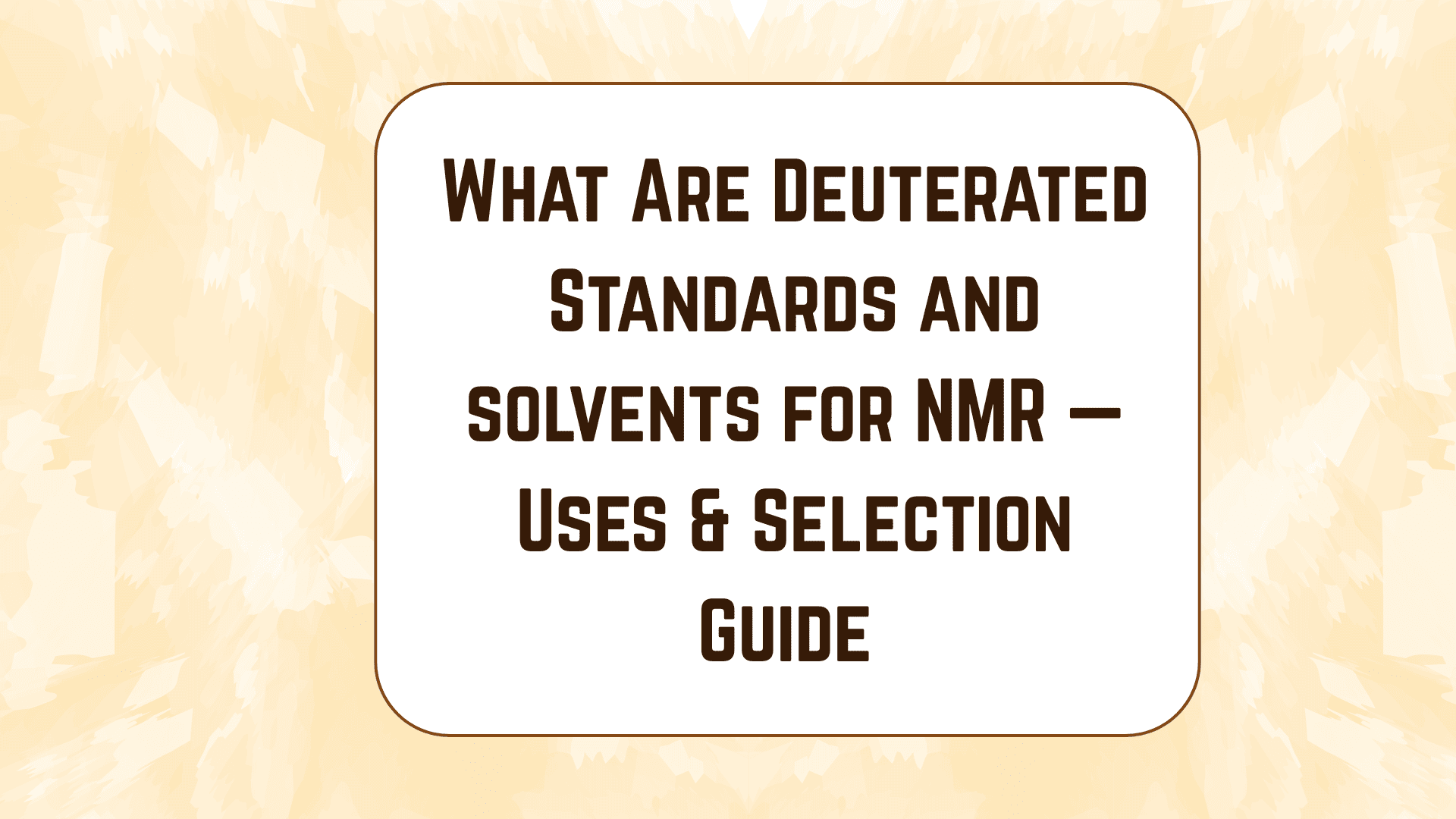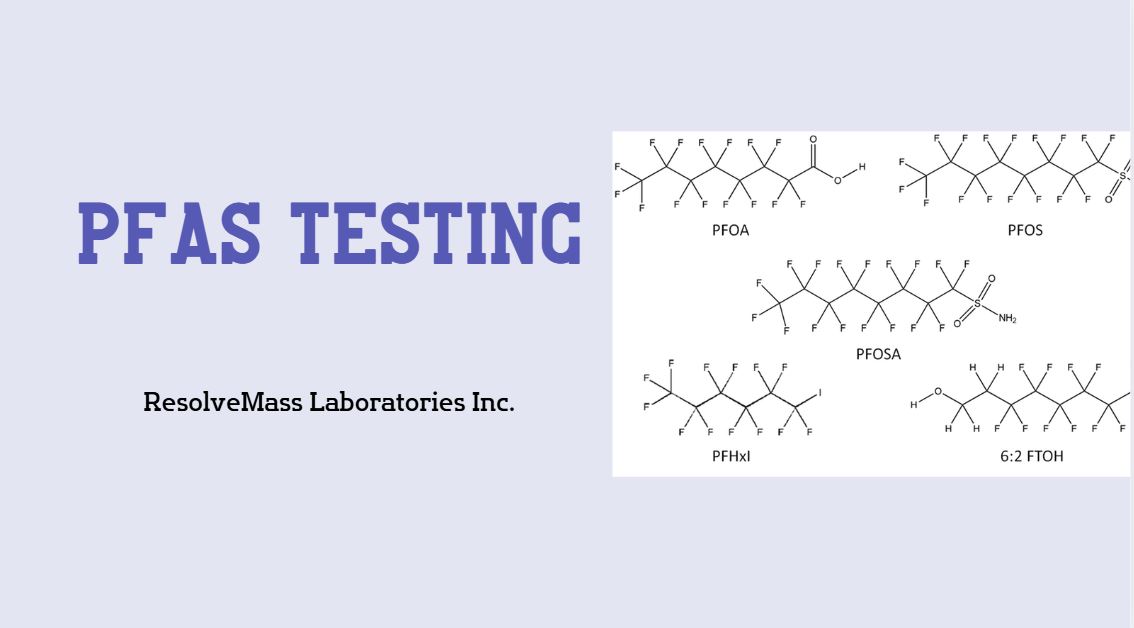Introduction
Deuterated Standards and Solvents for NMR are unique isotopically labeled compounds in which hydrogen (¹H) is replaced by deuterium (²H). This substitution allows researchers to capture clear, interference-free NMR spectra. By reducing proton resonance noise, these specialized materials ensure accurate peak detection, precise quantification, and improved solvent signal suppression — all essential for high-quality NMR analysis.
At ResolveMass Laboratories Inc., we focus on the synthesis, testing, and international supply of top-grade deuterated chemicals. Our products serve industries such as pharmaceuticals, materials science, and environmental research — where accuracy in NMR analysis defines data reliability. Using deuterated solvents minimizes background interference and enhances sensitivity, providing a solid foundation for consistent isotopic labeling and dependable analytical interpretation.
🔹 Summary of the Article
- Definition and importance of Deuterated Standards and Solvents for NMR
- How deuterated solvents improve signal accuracy
- Selection guide for solvent choice and compatibility
- Role of internal deuterated standards in calibration
- Industrial uses in pharmaceuticals, polymers, and materials science
- Real-world applications and global quality standards
- Trusted sourcing from ResolveMass Laboratories Inc.
- 10 most-asked FAQs on NMR deuterated compounds
This article offers an easy-to-understand yet comprehensive guide for anyone working with NMR. From definitions to practical applications, it helps ensure precise and reproducible analytical outcomes.
Video Guide: Deuterated Standards and Solvents for NMR Explained
🧠 What Are Deuterated Standards and Solvents for NMR?
Deuterated Standards and Solvents for NMR are compounds in which hydrogen atoms are replaced with deuterium, a stable isotope of hydrogen. This change eliminates unwanted proton signals that often interfere in NMR spectra, allowing scientists to analyze molecular structures with greater clarity.
In Nuclear Magnetic Resonance (NMR) spectroscopy, regular solvents can mask or distort sample peaks. Deuterated solvents such as D₂O or CDCl₃ solve this issue by minimizing signal overlap and improving spectral resolution. They also stabilize the magnetic field, leading to reproducible and accurate results. These solvents are vital for advanced studies in molecular structure and chemical dynamics.
Learn more: Custom Synthesis of Deuterated Chemicals
🔍 Why Are Deuterated Solvents Essential in NMR Analysis?
Deuterated solvents perform two vital functions in NMR spectroscopy:
- Reducing background signals – Since deuterium does not resonate in the same frequency range as protons, it eliminates solvent interference.
- Providing a frequency lock – The spectrometer uses the deuterium signal to maintain field stability during data collection.
| Solvent | Chemical Formula | Common Use | Boiling Point (°C) |
|---|---|---|---|
| Deuterated Chloroform | CDCl₃ | Organic compounds | 61 |
| Deuterated Methanol | CD₃OD | Polar compounds | 65 |
| Deuterated Dimethyl Sulfoxide | DMSO-d₆ | Biological & drug studies | 189 |
| Deuterated Water | D₂O | Aqueous solutions | 101 |
| Acetone-d₆ | (CD₃)₂CO | Ketone & carbonyl studies | 56 |
Using Deuterated Standards and Solvents for NMR improves both signal clarity and reproducibility of chemical shift data. Choosing the correct solvent ensures precise molecular differentiation, especially for complex organic structures.
🧪 What Are Deuterated Standards and Why Are They Used?
Deuterated standards are isotopically labeled internal references added to NMR samples for quantitative accuracy and calibration. They allow chemists to verify chemical shifts, validate reproducibility, and perform consistent inter-laboratory comparisons.
They play a critical role in:
- Quantitative NMR (qNMR) analysis
- Pharmaceutical quality control and metabolomics
- Isotopic labeling and drug metabolism research
ResolveMass Laboratories offers high-purity deuterated internal standards specifically designed for NMR calibration and traceable quantitation.
⚗️ How to Select the Right Deuterated Solvent for Your NMR Study
Selecting the best Deuterated Standards and Solvents for NMR depends on the type of sample, its polarity, and the nuclei of interest.
Key selection factors include:
- Solubility compatibility: Polar samples pair well with D₂O or DMSO-d₆, while non-polar compounds fit CDCl₃.
- Temperature stability: Choose high-boiling solvents such as DMSO-d₆ for elevated-temperature studies.
- Exchangeable protons: Avoid solvents that may exchange protons when analyzing labile groups.
A thoughtful solvent selection improves resolution and ensures accurate chemical shift readings. Each solvent interacts differently with analytes, influencing relaxation times and spectral sharpness.
Explore: Deuterated Polymers — Synthesis & Future Trends
🧫 Applications of Deuterated Standards and Solvents for NMR
1. Pharmaceutical Research and Development
These materials are crucial for verifying drug purity, structure elucidation, and metabolic studies. Deuterated Standards and Solvents for NMR assist in impurity detection, synthesis verification, and formulation analysis.
Read more: Deuterated APIs
2. Polymer and Material Science
Deuterated solvents help examine polymer dynamics, cross-linking, and degradation behavior under different conditions. This data is valuable for developing advanced, durable materials.
Related: Deuterated Acrylamide Derivatives
3. Analytical Chemistry and Calibration
Deuterated standards are essential for calibration in quantitative analysis, ensuring traceable and reproducible results that meet global quality benchmarks.
See: Stable Isotope Labeled Compounds
🧾 Table: Quick Guide to Common Deuterated Solvents
| Solvent | Type | Primary Use | Signal Reference |
|---|---|---|---|
| CDCl₃ | Non-polar | General organic | 7.26 ppm |
| D₂O | Polar | Biological | 4.79 ppm |
| DMSO-d₆ | Polar aprotic | Pharmaceuticals | 2.50 ppm |
| CD₃OD | Polar protic | Alcohols, peptides | 3.31 ppm |
| C₆D₆ | Aromatic | Hydrocarbon | 7.16 ppm |
This chart helps researchers compare solvent types and reference signals, which are crucial for interpreting precise NMR data.
🔬 Analytical Characterization and Quality Assurance
All Deuterated Standards and Solvents for NMR from ResolveMass Laboratories undergo thorough validation using GC-MS, NMR, and FTIR techniques. Every batch is verified for isotopic purity exceeding 99.8%, ensuring stability and reproducibility.
Each product includes a Certificate of Analysis (CoA) and traceable batch data, giving scientists confidence in analytical consistency and accuracy.
Learn more: Analytical Characterization of Deuterated Compounds
🌎 Why Choose ResolveMass Laboratories Inc.?
ResolveMass Laboratories Inc. is a trusted global manufacturer specializing in custom deuterated compounds. Our facilities in Canada and the U.S. follow ISO-compliant standards, providing research-grade materials for universities and industries alike.
We offer:
- In-house custom synthesis of deuterated compounds services
- Complete range of deuterated chemicals and reagents
- Expertise in deuterated reagents for pharmaceuticals and electronics
Our dedicated team ensures every synthesis meets international benchmarks for purity and performance, making ResolveMass a reliable partner for high-precision research.
✅ Conclusion
Deuterated Standards and Solvents for NMR are essential for producing accurate, interference-free, and reproducible results across scientific and industrial research. Partnering with ResolveMass Laboratories Inc. ensures access to expertly synthesized and validated deuterated materials — the gold standard in analytical chemistry. With superior purity, reliability, and innovation, our solutions empower scientists to achieve exceptional precision in every NMR experiment.
🧾 Frequently Asked Questions (FAQs)
Deuterated solvents are primarily used to eliminate interference from solvent peaks in NMR spectra. Because deuterium atoms do not resonate at the same frequency as protons, they allow scientists to observe the sample’s true signals with improved accuracy. These solvents also provide a stable frequency lock, ensuring consistency during the experiment.
CDCl₃ (Deuterated Chloroform) is preferred because it dissolves a wide range of organic compounds and produces a clean, well-defined reference signal. Its low boiling point, chemical stability, and cost-effectiveness make it suitable for routine NMR analysis in both academic and industrial laboratories.
Deuterated standards are reference compounds added to a sample for calibration and quantification, while deuterated solvents serve as the medium in which the sample is dissolved. Standards help validate accuracy and reproducibility of NMR data, whereas solvents ensure minimal interference during measurement.
These solvents reduce background proton noise and stabilize the spectrometer’s magnetic field, leading to more reliable chemical shift readings. Their use enhances signal clarity, resolution, and reproducibility, which are essential for identifying complex molecular structures.
Yes, deuterated solvents can be reused after purification through distillation or drying. However, repeated use can gradually lower isotopic purity, which might affect spectral precision. It is advisable to monitor purity levels before reusing them in critical analyses.
For accurate and reproducible NMR spectra, solvents should have an isotopic enrichment of at least 99.8%. This high purity minimizes interference, maintains baseline stability, and supports consistent spectral interpretation across different instruments and experiments.
Your choice depends on the solubility and polarity of your sample. D₂O is best suited for polar or water-soluble compounds, while CDCl₃ works well for non-polar organic molecules. Selecting the appropriate solvent ensures sharper peaks and clearer data.
References
- Munir, R., Zahoor, A. F., Khan, S. G., Hussain, S. M., Noreen, R., Mansha, A., Hafeez, F., Irfan, A., & Ahmad, M. (2025, August 21). Total syntheses of deuterated drugs: A comprehensive review. Top Current Chemistry (Cham), 383(3), 31. https://doi.org/10.1007/s41061-025-00515-x
- Di Martino, R. M., Maxwell, B. D., & Pirali, T. (2023). Deuterium in drug discovery: Progress, opportunities and challenges. Nature Reviews Drug Discovery, 22(7), 562–584. https://doi.org/10.1038/s41573-023-00703-8
- Kopf, S., Bourriquen, F., Li, W., … & Morandi, B. (2022). Recent developments for the deuterium and tritium labeling of organic molecules. Chemical Reviews, 122(6), 6634-6713. https://doi.org/10.1021/acs.chemrev.1c00795


